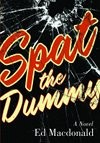Go into any bar of a certain type and you’re almost sure to see a guy like Spat Ryan. He’ll look like he’s been there for a while, sitting alone, but not so alone that he’s not compelled to voice his comments about all and sundry: the music, the weather, politics, women. He’s not old but not exactly young anymore either; not an obvious sociopath, but someone you nonetheless feel you’d engage at your peril, exuding, as he does, the hard drinker’s volatile mix of self-righteousness and self-loathing. So, would you like to get to know him? Well, Ed Macdonald’s debut novel is your chance. And here’s the thing: you’ll be glad you did.
“If I were a man whore, I’d be stinking rich,” unemployed divorcee Spat says of himself early on. “I’d probably have a little more self-respect, too. Maybe even some respect from other people.” The Montreal setting places him in a lineage: he’s a Leonard Cohen hero gone to seed, an older Duddy Kravitz, but without the ambition. There are no prizes for guessing that Spat’s bluster and self-deprecation belie a man in denial of something very upsetting; in his case it quite likely involves the small-time Irish hood who raised him. You’d be skittish, too, if you couldn’t see a maimed person on the street without wondering whether it was your father who’d done the damage. The spur to get to the root of all the angst comes when Spat learns that his ex-wife Patty (referred to by him, with typically charming affection, as Hitler) announces that she’s pregnant and that the child may be his. Using some handily inherited money, he flies to Australia, his mission to glean some family knowledge from his long-lost mother before embarking on the perils of parenthood himself.

Spat The Dummy
Ed Macdonald
Anvil Press
$20
paper
270pp
9781897535318
Structurally, Macdonald takes some risks, and they don’t all pay off. The big dark secret – the one alluded to repeatedly in the early chapters, the thing that will presumably make sense of the emotional train wreck Spat’s life has become – is revealed surprisingly early, and from that point on the novel is less a plot-driven family-mystery story than an extended first-person character study. In that sense, the book’s success really does depend on how the reader takes to Spat, and he’s by no means an easy ride. At several points, when it appears he’s attained some measure of maturity, he goes and gets plastered again. It can be maddening, but then, Spat is a maddening man. To present him as anything else would be to sell him short and to render less meaningful his ultimately poignant groping toward a greater self-recognition. Rest assured that even in enlightened mode Spat is still, frankly, a bit of a jerk. We wouldn’t want him any other way. mRb






0 Comments